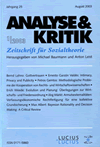Suchergebnisse
"Andrew Lister"
Titel: Justice as Fairness and Reciprocity
Autor: Andrew Lister
Seite: 93-112
Abstract: This paper tries to reconcile reciprocity with a fundamentally 'subject-centred' ethic by interpreting the reciprocity condition as a consequence of the fact that justice is in part a relational value. Duties of egalitarian distributive justice are not grounded on the duty to reciprocate benefits already received, but limited by a reasonable assurance of compliance on the part of those able to reciprocate, because their point is to constitute a valuable relationship, one of mutual recognition as equals. We have unconditional duty to help establish just global institutions, institutions which would allow us to share fairly in the burdens and benefits of global economic cooperation, but no unilateral duty to share fairly, where such institutions are not in place. Since non-contribution on the part of those unable to contribute involves no failure of recognition, the disabled do not fall outside the scope of distributive justice.
Titel: Comment on Andrew Lister: Just Distribution(s) for Mutual Recognition
Autor: Ivo Wallimann-Helmer
Seite: 113-122
Abstract: This comment questions Lister's reading of the reciprocity condition in three respects. First, it challenges the view that this condition necessarily leads to egalitarian claims about just distribution. Secondly, it questions Lister's argument that the reciprocity condition is linked to substantial schemes of egalitarian distribution irrespective of context. Thirdly, it claims that entitlements to justice for people with mental or psychological impairments cannot be based on a distinction between willingness and unwillingness to contribute to the cooperative venture of a society.

Work and Cooperation
2011 (33) Heft 1
Editorial
Both in social theories with the aim of looking into the creative core of society as well as in everyday politics, two intuitions often supplement each other. The first intuition, empirico-analytical, views common organization of work and production as being the very aim of society, and other parts of society being explicable from this. A second intuition, ethical or moral, holds the sphere of work to be the central site for diagnoses of a society's inherent justice. Both intuitions not only con...